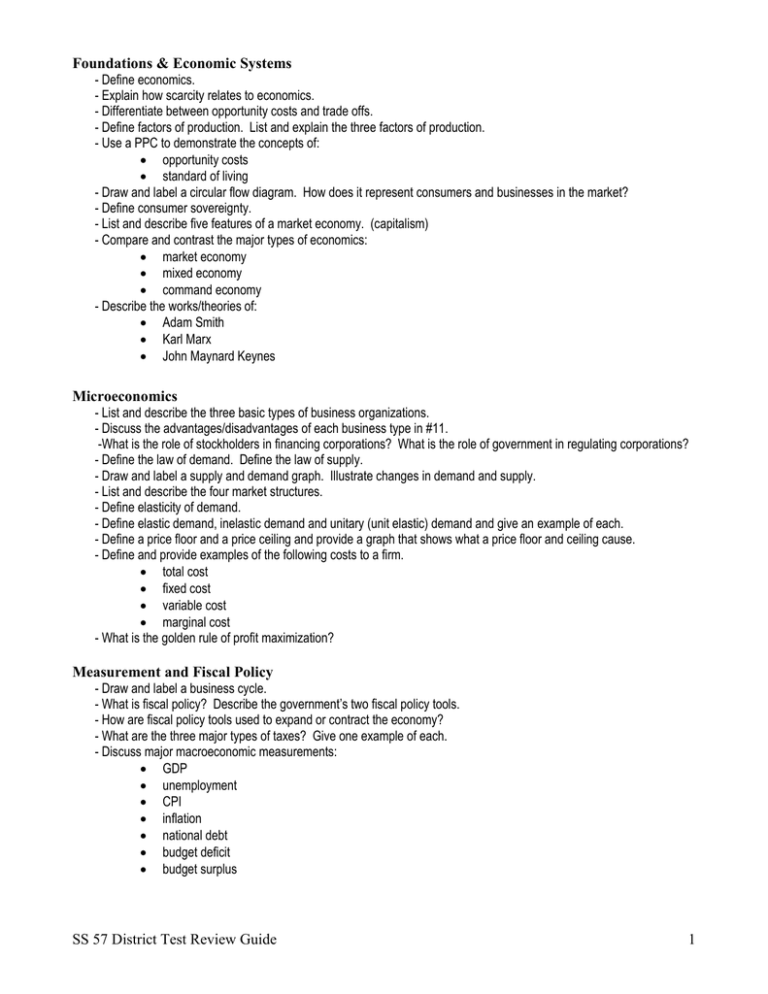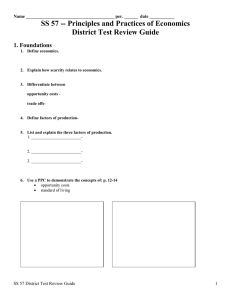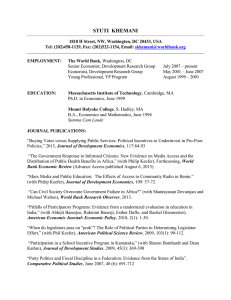Foundations & Economic Systems
advertisement

Foundations & Economic Systems - Define economics. - Explain how scarcity relates to economics. - Differentiate between opportunity costs and trade offs. - Define factors of production. List and explain the three factors of production. - Use a PPC to demonstrate the concepts of: opportunity costs standard of living - Draw and label a circular flow diagram. How does it represent consumers and businesses in the market? - Define consumer sovereignty. - List and describe five features of a market economy. (capitalism) - Compare and contrast the major types of economics: market economy mixed economy command economy - Describe the works/theories of: Adam Smith Karl Marx John Maynard Keynes Microeconomics - List and describe the three basic types of business organizations. - Discuss the advantages/disadvantages of each business type in #11. -What is the role of stockholders in financing corporations? What is the role of government in regulating corporations? - Define the law of demand. Define the law of supply. - Draw and label a supply and demand graph. Illustrate changes in demand and supply. - List and describe the four market structures. - Define elasticity of demand. - Define elastic demand, inelastic demand and unitary (unit elastic) demand and give an example of each. - Define a price floor and a price ceiling and provide a graph that shows what a price floor and ceiling cause. - Define and provide examples of the following costs to a firm. total cost fixed cost variable cost marginal cost - What is the golden rule of profit maximization? Measurement and Fiscal Policy - Draw and label a business cycle. - What is fiscal policy? Describe the government’s two fiscal policy tools. - How are fiscal policy tools used to expand or contract the economy? - What are the three major types of taxes? Give one example of each. - Discuss major macroeconomic measurements: GDP unemployment CPI inflation national debt budget deficit budget surplus SS 57 District Test Review Guide 1 Money, Banking and Monetary Policy - What are the three functions (uses) of money? - List four characteristics of money. - Differentiate fiat vs. representative money. - Provide a short response about the FED. history purpose structure - What are the three tools of the Federal Reserve? How does each tool work to expand or contract the economy? Personal Finance and Decision Making - Compare the different types of profits for investors: interest dividends capital gains - Define the following key consumer terms: mortgage credit rating collateral budget - Compare investment options: savings bonds stocks mutual funds - Describe the corporate structure from stockholders to workers. International Trade - Define export. Define import. How do exports and imports combine to create a nation’s trade balance? - List and define two examples of trade barriers. How do trade barriers affect trade between countries? (e.g., protectionism) - Identify two free trade agreements. Why do countries develop free trade agreements to reduce protectionism? - Identify the following issues related to globalization: cultural imperialism outsourcing developing nations SS 57 District Test Review Guide 2


